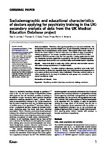Sociodemographic and educational characteristics of doctors applying for psychiatry training in the UK: secondary analysis of data from the UK Medical Education Database project
| dc.contributor.author | Lambe, P | |
| dc.contributor.author | Gale, T | |
| dc.contributor.author | Price, T | |
| dc.contributor.author | Roberts, M | |
| dc.date.accessioned | 2019-07-08T07:31:11Z | |
| dc.date.issued | 2019-05-10 | |
| dc.identifier.issn | 2056-4694 | |
| dc.identifier.issn | 2056-4708 | |
| dc.identifier.uri | http://hdl.handle.net/10026.1/14609 | |
| dc.description.abstract |
<jats:sec id="S2056469419000330_sec_a1"><jats:title>Aims and method</jats:title><jats:p>Workforce shortages in psychiatry are common worldwide. The international literature provides insights into factors influencing decisions to train in psychiatry but is predominately survey based. This national cohort study aimed to identify the characteristics of doctors who were most likely to apply to psychiatry training programmes. The sample comprised doctors who entered UK medical schools in 2007/8 and who made first-time specialty training applications in 2015. The association between application to psychiatry and doctors' sociodemographic and educational characteristics was examined using multivariable logistic regression.</jats:p></jats:sec><jats:sec id="S2056469419000330_sec_a2" sec-type="results"><jats:title>Results</jats:title><jats:p>Those most likely to apply were White, privately educated older doctors with below average performance at medical school.</jats:p></jats:sec><jats:sec id="S2056469419000330_sec_a3"><jats:title>Clinical implications</jats:title><jats:p>To reduce workforce shortages, psychiatry must make itself more attractive to all doctors, especially those from underrepresented groups such as state-educated Black and minority ethnic individuals. Otherwise, national policies to widen participation in the study of medicine by such groups may exacerbate the current recruitment crisis.</jats:p></jats:sec> | |
| dc.format.extent | 264-270 | |
| dc.format.medium | Print-Electronic | |
| dc.language | en | |
| dc.language.iso | en | |
| dc.publisher | Royal College of Psychiatrists | |
| dc.rights | Attribution-NonCommercial-ShareAlike 4.0 International | |
| dc.rights | Attribution-NonCommercial-ShareAlike 4.0 International | |
| dc.rights | Attribution-NonCommercial-ShareAlike 4.0 International | |
| dc.rights | Attribution-NonCommercial-ShareAlike 4.0 International | |
| dc.rights | Attribution-NonCommercial-ShareAlike 4.0 International | |
| dc.rights | Attribution-NonCommercial-ShareAlike 4.0 International | |
| dc.rights | Attribution-NonCommercial-ShareAlike 4.0 International | |
| dc.rights | Attribution-NonCommercial-ShareAlike 4.0 International | |
| dc.rights | Attribution-NonCommercial-ShareAlike 4.0 International | |
| dc.rights.uri | http://creativecommons.org/licenses/by-nc-sa/4.0/ | |
| dc.rights.uri | http://creativecommons.org/licenses/by-nc-sa/4.0/ | |
| dc.rights.uri | http://creativecommons.org/licenses/by-nc-sa/4.0/ | |
| dc.rights.uri | http://creativecommons.org/licenses/by-nc-sa/4.0/ | |
| dc.rights.uri | http://creativecommons.org/licenses/by-nc-sa/4.0/ | |
| dc.rights.uri | http://creativecommons.org/licenses/by-nc-sa/4.0/ | |
| dc.rights.uri | http://creativecommons.org/licenses/by-nc-sa/4.0/ | |
| dc.rights.uri | http://creativecommons.org/licenses/by-nc-sa/4.0/ | |
| dc.rights.uri | http://creativecommons.org/licenses/by-nc-sa/4.0/ | |
| dc.subject | Psychiatry | |
| dc.subject | medical education | |
| dc.subject | recruitment | |
| dc.subject | training | |
| dc.subject | workforce | |
| dc.title | Sociodemographic and educational characteristics of doctors applying for psychiatry training in the UK: secondary analysis of data from the UK Medical Education Database project | |
| dc.type | journal-article | |
| dc.type | Article | |
| plymouth.author-url | https://www.ncbi.nlm.nih.gov/pubmed/31072417 | |
| plymouth.issue | 6 | |
| plymouth.volume | 43 | |
| plymouth.publication-status | Published | |
| plymouth.journal | BJPsych Bulletin | |
| dc.identifier.doi | 10.1192/bjb.2019.33 | |
| plymouth.organisational-group | /Plymouth | |
| plymouth.organisational-group | /Plymouth/Faculty of Health | |
| plymouth.organisational-group | /Plymouth/Faculty of Health/Peninsula Medical School | |
| plymouth.organisational-group | /Plymouth/REF 2021 Researchers by UoA | |
| plymouth.organisational-group | /Plymouth/REF 2021 Researchers by UoA/UoA23 Education | |
| plymouth.organisational-group | /Plymouth/Research Groups | |
| plymouth.organisational-group | /Plymouth/Research Groups/Plymouth Institute of Health and Care Research (PIHR) | |
| plymouth.organisational-group | /Plymouth/Users by role | |
| plymouth.organisational-group | /Plymouth/Users by role/Academics | |
| dc.publisher.place | England | |
| dcterms.dateAccepted | 2019-04-09 | |
| dc.rights.embargodate | 2019-7-11 | |
| dc.identifier.eissn | 2056-4708 | |
| dc.rights.embargoperiod | Not known | |
| rioxxterms.versionofrecord | 10.1192/bjb.2019.33 | |
| rioxxterms.licenseref.uri | http://creativecommons.org/licenses/by-nc-sa/4.0/ | |
| rioxxterms.licenseref.startdate | 2019-05-10 | |
| rioxxterms.type | Journal Article/Review |



